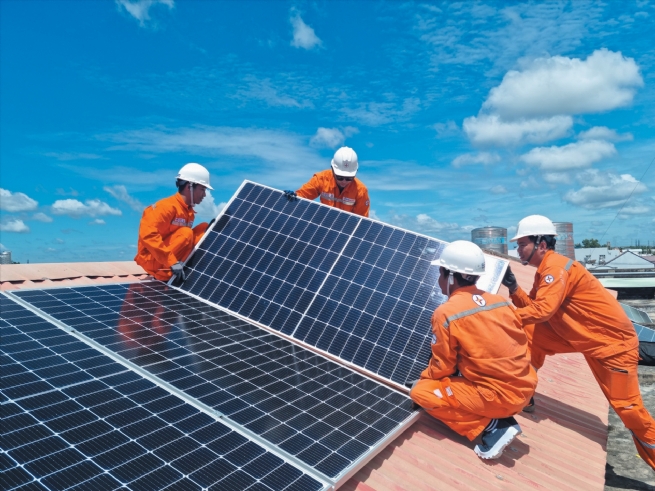9:42:32 AM | 9/4/2024
“The investment for rooftop solar power is an important basis for companies to get green certificates and bonus points in exports to major global markets,” said Mr. Vo Tan Thanh, Vice President of the Vietnam Chamber of Commerce and Industry (VCCI) at the Forum on “Rooftop Solar Power for Businesses: Solution for Energy Transition and Efficiency”. The event was organized by the Business Forum Magazine in collaboration with the Institute for Smart Energy Applications Research (iSEAR).

Utilizing rooftop solar power not only enables businesses to reduce costs and generate electricity for production but also enhances their competitive edge in export markets
A certain trend
Rooftop solar power is a clean source of electricity locally distributed and consumed in small scale. This reduces losses in transmission and distribution, utilizes available grid infrastructure, takes advantage of daytime energy sources and eases loads during peak hours of the power system. Therefore, using rooftop solar power not only helps businesses reduce costs and actively generates electricity for production but also sharpens competitive advantages in export.
Power Plan 8, approved by the Prime Minister in Decision 500/QD - TTg issued on May 15, 2023, also emphasizes the need to focus on investment and encourage economic sectors to rapidly develop the electricity industry on the principle of fair competition. This plan adopts a market mechanism on electricity prices and ensures harmonized interests of stakeholders in electricity investment, utility and development. Regarding rooftop solar power sources, Power Plan 8 structures the power source: By 2030, 50% of office buildings and 50% of houses will use rooftop solar power for self-production and self-consumption; rooftop solar power sources that are self-produced, self-consumed, and not connected to the grid will be given priority for unlimited capacity development.
Delivering the opening speech to the forum, Thanh said that, in the context of deep international economic integration, businesses must prioritize investment in developing rooftop solar power because it not only helps them reduce production costs and carbon emissions significantly but also helps them improve their export competitiveness, thus boosting their profitability.
Recent changes in major markets have generated considerable pressure to force exporters to make necessary changes to adapt whether they want it or not, he added. For example, the European Union (EU) is focusing on fostering the European Green Deal Strategy, according to which products such as apparel, electronics, information technology, agricultural and food products exported to the EU must meet strict requirements on energy efficiency, emission reduction, waste and recycling. “The shift to green production in Europe and major global markets will create more opportunities for Vietnam to advance its journey to a green economy and realize its commitment to zero emissions by 2050. The investment for rooftop solar power will be an important foundation for Vietnamese businesses to get green certificates and earn bonus points in exports to giant markets while opening up opportunities to access global markets with high quality requirements,” Thanh emphasized.
Clearing obstacles to businesses
Businesses are still confronting a lot of difficulties in investing and installing rooftop solar power systems due to the absence of specific regulations and technical standards for implementation. In addition, the draft decree on mechanisms and policies to encourage the development of self-produced and self-consumed rooftop solar power, which was recently proposed for adjustment, shows that there are still many administrative procedures and some unclear and inconsistent points in the implementation process. Specifically, agencies, organizations and households installing self-produced and self-consumed rooftop solar power need to complete procedures such as construction, environment and fire prevention according to current legal regulations. They still have to carry out other administrative procedures (like investment license, fire prevention acceptance and environmental protection certificate) at the Provincial/Municipal Department of Industry and Trade, which costs much time and money.
The implementation of the strategy for reduction of greenhouse gas emissions and implementation of the European Green Deal has created huge changes in Vietnam's exportation. Therefore, the desire of the business community is the Government will soon introduce a mechanism to encourage rooftop solar power development to promote and develop green energy sources in business, especially in industrial parks and export processing zones.
To remove obstacles in investment and installation, businesses also proposed that relevant ministries and agencies soon build and introduce technical standards applicable to components of the rooftop solar power system, and focus on simplifying administrative procedures, promptly completing the legal framework on related procedures (regarding investment, planning, construction, environmental protection and fire prevention) to attract more investment resources, encouraging businesses to boldly and actively shift to use renewable energy in production.
Regarding the difficulty in capital sources for green transformation, Mr. Tran Thien Long, Standing Vice President of the Vietnam Industrial Real Estate Association (VIREA) hoped that the Government or the State Bank of Vietnam (SBV) will soon establish a green financial support fund for businesses to invest in rooftop solar power. “A factory, even an industrial park, will find it very difficult to carry out green transformation without the cooperation of the government and local authorities through support policies for consistent and effective implementation,” he affirmed
In addition to financial concerns, the Ministry of Industry and Trade’s cap on the grid-connected rooftop solar power capacity of 2,600 MW according to Power Plan 8 also makes businesses worried about the limit imposed on their installed capacity. Hence, they also proposed that the Government consider expanding the installed capacity of solar power in the plan or removing the quota allocated to provinces and cities so as to encourage and attract economic sectors and people to invest in installing rooftop solar power for manufacturing and business and help ensure national energy security.
By My Chau, Vietnam Business Forum